
Brent Linen Hire Hotel Linen; Table Linen and Chef Uniforms Hire in London Hotels Bed Sheets and Linen Hire and Service, Suppliers, Wholesale, in London, UK at Cheap Price to Reduce your Costs Brent Linen Hire, a commercial laundry in London was established in the year 2010 with a slogan Believes in Service;. Customers; full satisfaction is our satisfaction.
Monday, 9 October 2017
One-stop shop for laundry stain removal Brent Linen Hire (www.brentlinenhire.co.uk) has replaced an extensive range of laundry stain removal products in place of ACE for Whites. The London-based company offers a one-stop shop for all catering requirements, from providing table linens to full-service kitchens complete with furniture. ACE for Whites become the company’s one-stop shop for stain removal, with advanced cleaning power to remove stains and brighten whites whilst being gentle on fabrics. We gave it a go to clean our table cloths, slips and napkins, not expecting much, and it was amazing. We launder around 45 washes a week which can double throughout the summer months during wedding season. We used to need a range of products formulated specifically for different stains, now we only need one. We get around 15 washes from a £1 bottle of ACE for Whites – and we don’t spare on the amount we use! It has saved us a fortune on cleaning products. “At Brent Linen Hire we cater for a range of events from weddings and festivals to occasions of all shapes and sizes. The stains are never ending – from grass, ink, wine and grease to an array of food spills – and we’re yet to find a stain that ACE for Whites can’t tackle. One particular, originally white, tablecloth came back from an event almost black with dirt. We had nothing to lose, so pre-treated and washed it with ACE for Whites. To our amazement, it came out sparkling white again!" The best thing about ACE for Whites is that it doesn’t discolour the cloth, whereas a lot of other products that we’ve used in the past either don’t get the stains out or turn white linens yellow. All our cloths are either black or white so we have a bottle of ACE for Colours on hand for when someone all but ruins one of the darker cloths – it’s bound to happen at some point!”
Lightweight mats for slippery areas
Lightweight mats for slippery areas
Comfort, safety, hygiene and longevity are the key features of Kleen-Tex’s new Kleen-Thru Plus lightweight mats, which can be linked to cover larger floor areas.
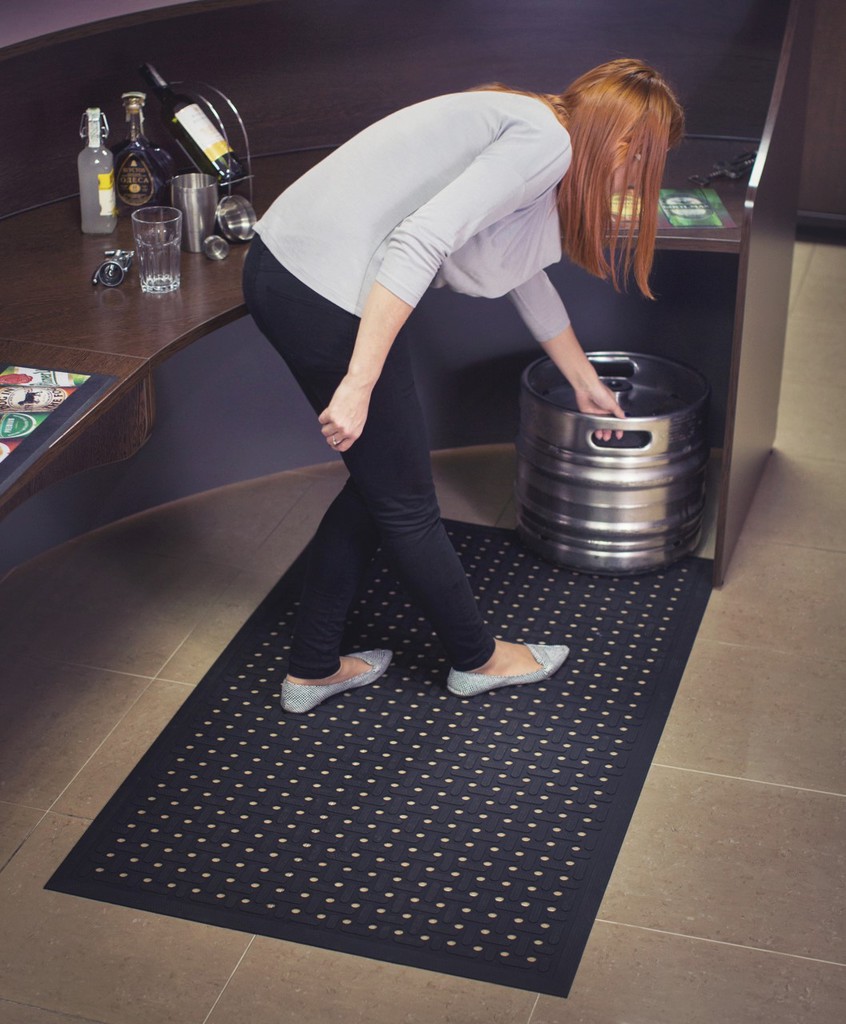
Designed specifically for the food and beverage sector, these hard-wearing mats provide a secure foothold in the wet areas of kitchens and bars. Available in two sizes, 86cm x 143cm / 86cm x 60cm, they can also be linked together using a unique connector designed by Kleen-Tex to maximise flexibility.
The lighter mats are easier to lift and move to ensure thorough cleaning. They can be pressure washed, steam cleaned or hosed and are also suitable for commercial laundering.
What’s more, their ergonomic design offers impressive anti-fatigue properties for maximum employee comfort and safety. Low profile edges help to minimise trip and fall accidents, whilst liquids and debris flow easily through the holes and away from shoes.
Constructed of 100% nitrile rubber for maximum resistance to water, oils, kitchen greases, chemicals and animal fats, these mats also have a long-lasting anti-microbial active substance built into the rubber. This prevents odours and the development of bacteria and fungi on the mat and will withstand regular cleaning without rubbing off or losing effectiveness over time.
The lighter mats are easier to lift and move to ensure thorough cleaning. They can be pressure washed, steam cleaned or hosed and are also suitable for commercial laundering.
What’s more, their ergonomic design offers impressive anti-fatigue properties for maximum employee comfort and safety. Low profile edges help to minimise trip and fall accidents, whilst liquids and debris flow easily through the holes and away from shoes.
Constructed of 100% nitrile rubber for maximum resistance to water, oils, kitchen greases, chemicals and animal fats, these mats also have a long-lasting anti-microbial active substance built into the rubber. This prevents odours and the development of bacteria and fungi on the mat and will withstand regular cleaning without rubbing off or losing effectiveness over time.
The recipe for success
The recipe for success
Creating a safe and healthy environment through cleaning is always important – but when that’s in a food area, the demands are even higher. With risks to public health significant, the application of scientific knowledge is essential, explains Delia Cannings, of training and solutions provider Environmental Excellence Training & Development

Ingesting food stuffs contaminated through poor standards of cleaning or incorrect use of chemicals is a serious matter. The UK has more than 500,000 reported cases of food poisoning each year with cross contamination one of the most common causes. Cleaning in catering environments sits alongside clinical areas in terms of risk, with levels of compliance different to other environments. Those Four Ts of cleaning – time, tools, technique and training – need to be robustly reviewed. With 24 hour facilities, the ‘clean as you go’ regime has to be stepped up so things are not left to deteriorate over a period of time.
Deep cleans
There will always come a point when you need to get behind that piece of equipment. Therefore your deep clean should be linked to routine maintenance – for instance having the oven serviced is the ideal time for accessing and cleaning the harder to reach areas. Frequency will depend on footfall and activity, but best practice is to deep clean quarterly. This should be documented; evidence can be used to substantiate audits and inspections.
Mould, fungi and spores
Kitchens, with areas of large chillers and hot food preparation areas, experience constant changes in temperature making them susceptible to mould, fungi and spores. Airborne, these can cause food poisoning. A thorough inspection routine is needed to look for potential troublespots. Your cleaning regime should stop the growth in the first place, but once you have them they are almost impossible to eradicate and you must clean in a way to keep on top of them. Steam cleaning is good for helping to both prevent and alleviate the problem; and look for a cleaning agent with properties to restrict their growth.
Cleaning equipment
A look in any cleaning cupboard will tell you a great deal about the service that is given, with safe, orderly storage and decontamination of equipment essential. In food prep areas the storage of cleaning agents should be as far away as possible, ideally with doors locked and key coded to allow authorised access only.
There is no national scheme for colour coding but it is a vital tool and a concept easily understood by those in kitchens familiar with colour coded chopping boards.
Personal hygiene
There are of course personal hygiene regulations: uniforms must be clean , hair must be in a net or beards covered; jewellery kept to a minimum as it can harbour bacteria; cuts covered with a plaster of a colour which would stand out if dropped in food; no nail varnish; closed-toed shoes; and legs covered as they will shed skin. All of these aspects should be followed by those cleaning in food environments.
Floorcare
Never sweep in a kitchen as it will cause dust to circulate, so opt for a damp system. There is likely to be lots of stainless steel therefore cleaning operatives need to be trained in its particular care, avoiding any abrasive techniques.
Safety
Safety issues will include greasy and slippery floors; plug sockets which need to be masked off especially when introducing moisture; and ensuring equipment is switched off.
Chemicals
Chemical competence and an understanding of the four main groups of cleaning agents – neutral, alkaline, acid and cleaning disinfectant – will enable the operative to select the right agent for the type of soil needing to be removed.
Supporting staff
Any clean will only be as good as the person doing it, so remember that the cleaning resource is not just the equipment and consumables. The most valuable asset is the cleaning operative. If they are developed and supported, given the tools and time to do the job, you will get a great, professional clean.
The focus in food areas is – no surprise – the food, with cleaning too often a poor relation. Recently we have begun to realise that they are inter-related. I believe legislation in this area is crucial; we have specific requirements for those handling food, but not for those cleaning. It’s time for a minimum compulsory training requirement for people who clean for a living.
Deep cleans
There will always come a point when you need to get behind that piece of equipment. Therefore your deep clean should be linked to routine maintenance – for instance having the oven serviced is the ideal time for accessing and cleaning the harder to reach areas. Frequency will depend on footfall and activity, but best practice is to deep clean quarterly. This should be documented; evidence can be used to substantiate audits and inspections.
Mould, fungi and spores
Kitchens, with areas of large chillers and hot food preparation areas, experience constant changes in temperature making them susceptible to mould, fungi and spores. Airborne, these can cause food poisoning. A thorough inspection routine is needed to look for potential troublespots. Your cleaning regime should stop the growth in the first place, but once you have them they are almost impossible to eradicate and you must clean in a way to keep on top of them. Steam cleaning is good for helping to both prevent and alleviate the problem; and look for a cleaning agent with properties to restrict their growth.
Cleaning equipment
A look in any cleaning cupboard will tell you a great deal about the service that is given, with safe, orderly storage and decontamination of equipment essential. In food prep areas the storage of cleaning agents should be as far away as possible, ideally with doors locked and key coded to allow authorised access only.
There is no national scheme for colour coding but it is a vital tool and a concept easily understood by those in kitchens familiar with colour coded chopping boards.
Personal hygiene
There are of course personal hygiene regulations: uniforms must be clean , hair must be in a net or beards covered; jewellery kept to a minimum as it can harbour bacteria; cuts covered with a plaster of a colour which would stand out if dropped in food; no nail varnish; closed-toed shoes; and legs covered as they will shed skin. All of these aspects should be followed by those cleaning in food environments.
Floorcare
Never sweep in a kitchen as it will cause dust to circulate, so opt for a damp system. There is likely to be lots of stainless steel therefore cleaning operatives need to be trained in its particular care, avoiding any abrasive techniques.
Safety
Safety issues will include greasy and slippery floors; plug sockets which need to be masked off especially when introducing moisture; and ensuring equipment is switched off.
Chemicals
Chemical competence and an understanding of the four main groups of cleaning agents – neutral, alkaline, acid and cleaning disinfectant – will enable the operative to select the right agent for the type of soil needing to be removed.
Supporting staff
Any clean will only be as good as the person doing it, so remember that the cleaning resource is not just the equipment and consumables. The most valuable asset is the cleaning operative. If they are developed and supported, given the tools and time to do the job, you will get a great, professional clean.
The focus in food areas is – no surprise – the food, with cleaning too often a poor relation. Recently we have begun to realise that they are inter-related. I believe legislation in this area is crucial; we have specific requirements for those handling food, but not for those cleaning. It’s time for a minimum compulsory training requirement for people who clean for a living.
Simplify food factory hygiene
Simplify food factory hygiene
Ozo Innovations (Ozo) is planning to make food factory hygiene more robust and sustainable with the launch of eloclear, a single step cleaning and disinfection system.
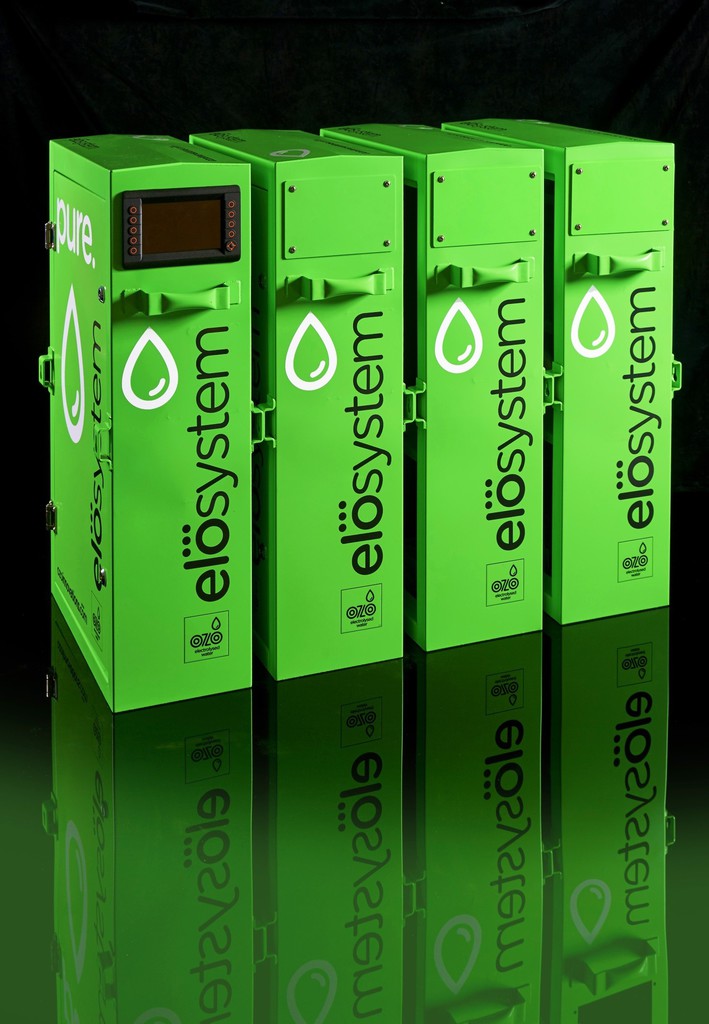
Ozo supports food industry customers to improve their sustainability credentials, win new business and gain production capacity by reducing time spent on achieving hygiene standards, whilst improving deep cleaning and disinfection.
Customers make eloclear onsite using Ozo’s elosystem which transforms food grade salt and water into a powerful cleaner and biocide. In field trials, the company proved that eloclear delivered greater microbial control and a more consistent disinfection result than traditional hot water, detergents and terminal sanitisers.
On site production of eloclear is monitored and controlled using advanced sensors; secure data recording and 24/7 monitoring. Authorised and authenticated, customers can monitor production using a computer or smart device. Ozo undertakes continuous analysis of customer site data to be able to detect any production issues and to ensure that the eloclear is effective at the point of use.
Rowan Gardner, CEO of Ozo Innovations, said: “Our objective was to make effective hygiene simpler to achieve for the food industry. Currently, companies invest significant time and resources in deep cleaning food facilities. Switching a hot water based multistep hygiene process for a simple cold eloclear process is measurably more energy and time efficient.”
Customers make eloclear onsite using Ozo’s elosystem which transforms food grade salt and water into a powerful cleaner and biocide. In field trials, the company proved that eloclear delivered greater microbial control and a more consistent disinfection result than traditional hot water, detergents and terminal sanitisers.
On site production of eloclear is monitored and controlled using advanced sensors; secure data recording and 24/7 monitoring. Authorised and authenticated, customers can monitor production using a computer or smart device. Ozo undertakes continuous analysis of customer site data to be able to detect any production issues and to ensure that the eloclear is effective at the point of use.
Rowan Gardner, CEO of Ozo Innovations, said: “Our objective was to make effective hygiene simpler to achieve for the food industry. Currently, companies invest significant time and resources in deep cleaning food facilities. Switching a hot water based multistep hygiene process for a simple cold eloclear process is measurably more energy and time efficient.”
Food safety tips
Food safety tips
On 18th July 2017, Dr. Ruth Petran, VP food safety and public health, explained to the audience of an Ecolab Food Safety webinar the factors contributing to foodborne illness, potential impact on brand and the key components of a strong food safety programme to keep staff and customers safe.
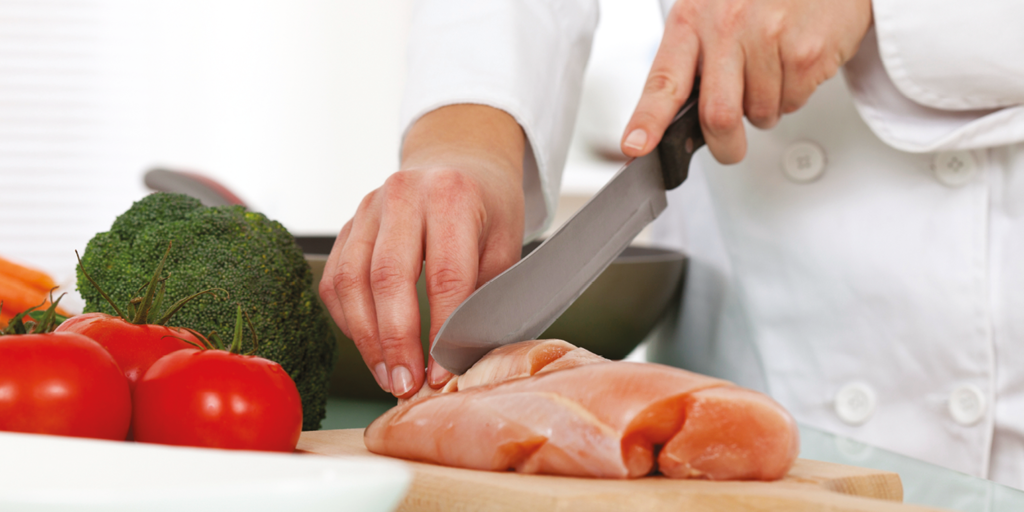
Here are ten tips, as outlined in the webinar, for a strong food safety programme:
Clean Environments
Clean Environments
- Make sure hand washing stations are visible, easily accessible and fully stocked
- Establish regular cleaning protocols for food contact surfaces AND non-food contact surfaces
- With your suppliers, establish a protocol for inspection of all food deliveries
- In food preparation areas, establish procedures for surfaces, equipment, utensils and provide guidelines/ equipment for proper hygiene and cooking temperatures
- Set proper procedures for food storage by refrigerator and storage areas
- Establish a relationship with local public health officials and utilise health inspections and voluntary third party assessments to set best practices for your operation
- Conduct regular daily, monthly and quarterly assessments to track progress and identify opportunities for improvement
- Stay connected with your network to remain informed of the latest in food safety issues and regulations
- Establish rigorous food safety on-boarding training for new hires and follow up with continuous education and visibility for all staff
- Post signage in appropriate areas to keep best practices top of mind
Anti-microbial recycling bin
Anti-microbial recycling bin
To further encourage the adoption of recycling in the food and healthcare industries, Leafield Environmental has developed the SteriBin, a pedal operated recycling bin that possesses anti-microbial properties.
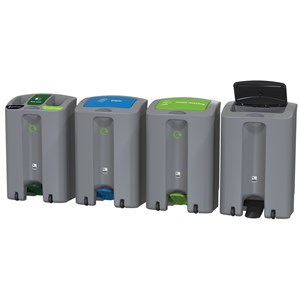
Originally designed to accommodate three different waste streams, the SteriBin Triple has two outer open apertures and a lidded aperture in the middle, operated by a foot pedal, for total hands-free, hygienic operation. A single stream version is also available with a single, foot pedal operated lid. Optional lid handles are available to provide access by people unable to operate the foot pedals.
Slim enough to stand back against the wall in corridors and individual rooms, the durable, rotationally moulded Steribin stands some 970mm high (1110mm with the lid open). Used with plastic sacks it has a total capacity of 90 litres, split 30/30/30 in the three waste stream version. For heavier waste items such as paper or food, a 67 litre plastic liner is available.
SteriBins are moulded from a polyethylene blend that incorporates a non-leaching silver component that ensures effective antibacterial protection for the effective lifetime of the product, helping to keep surfaces clean and hygienic, and reducing the threat of cross-contamination.
Tested on over 50 different bacteria species, the antimicrobial material has been proven to reduce harmful micro-organisms such as MRSA, E.Coli, Listeria, Salmonella and Campylobacter by up to 99.99%.
Large graphics along with WRAP compliant icons and lid colours identify the individual waste streams to help minimise cross contamination. These graphics are moulded-in and are an integral part of the surface and unlike a label, cannot be peeled off. There are no label recesses or lifted label edges to harbour germs.
The smooth contours of the bin make for easy cleaning and all parts are easily removable for ‘deep cleaning’ purposes. A removable base drip tray is also provided to catch liquid waste should a bag become torn.
Slim enough to stand back against the wall in corridors and individual rooms, the durable, rotationally moulded Steribin stands some 970mm high (1110mm with the lid open). Used with plastic sacks it has a total capacity of 90 litres, split 30/30/30 in the three waste stream version. For heavier waste items such as paper or food, a 67 litre plastic liner is available.
SteriBins are moulded from a polyethylene blend that incorporates a non-leaching silver component that ensures effective antibacterial protection for the effective lifetime of the product, helping to keep surfaces clean and hygienic, and reducing the threat of cross-contamination.
Tested on over 50 different bacteria species, the antimicrobial material has been proven to reduce harmful micro-organisms such as MRSA, E.Coli, Listeria, Salmonella and Campylobacter by up to 99.99%.
Large graphics along with WRAP compliant icons and lid colours identify the individual waste streams to help minimise cross contamination. These graphics are moulded-in and are an integral part of the surface and unlike a label, cannot be peeled off. There are no label recesses or lifted label edges to harbour germs.
The smooth contours of the bin make for easy cleaning and all parts are easily removable for ‘deep cleaning’ purposes. A removable base drip tray is also provided to catch liquid waste should a bag become torn.
Sanitising warewasher for care homes
Sanitising warewasher for care homes
For care homes, sanitisation is an essential. Winterhalter’s UC undercounter machines are available with a thermal disinfection option – and care homes can now install them under the Pay Per Wash initiative. This means there’s no upfront cost, operators simply pay for each wash as they go along.
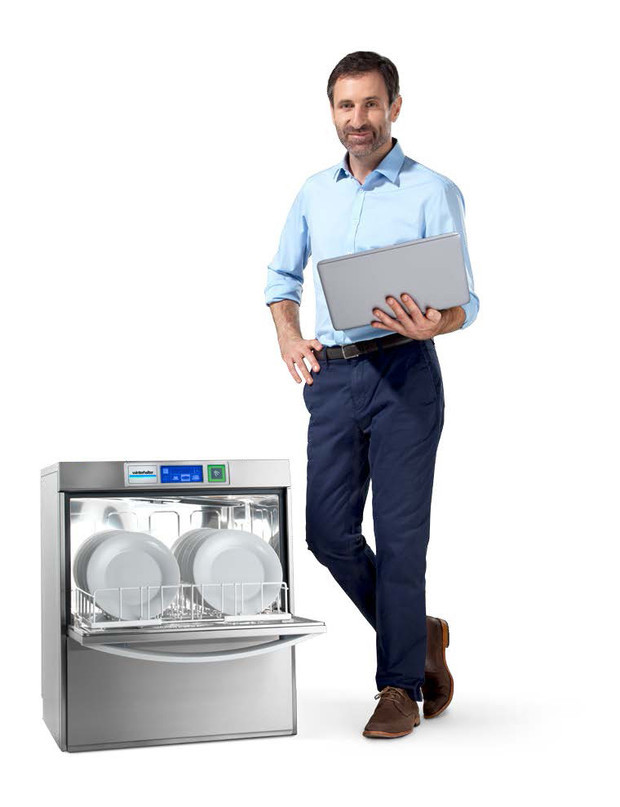
The UC is a front-loading machine that’s available in four different sizes, small, medium, large and extra-large. The thermal disinfection wash cycle meets the HMT2030 regulations by washing at 73ºC for 3 minutes, delivering total hygiene control. Using this wash programme, the UC can handle up to 10 racks per hour, with the racks ranging in size from 400x400mm in the small model to 500x540mm in the extra-large. When the thermal disinfection programme is not required, the UC can handle up to 48 racks per hour. Its compact size means it can fit into small kitchens, while its high output means it can wash quickly and effectively.
Under Winterhalter’s Pay Per Wash scheme, care homes can have a UC machine installed for free – they simply pay as they wash, with costs starting from under 27p per wash cycle. The cost covers everything: the Winterhalter warewasher, plus Winterhalter chemicals, service and maintenance. It covers installation and training. It even covers repairs (provided they are not the result of misuse).
Operators select a desired number of wash cycles and prepay for them, using a credit card. The warewasher is internet-connected and the wash codes bought are automatically entered into the machine, so staff can start washing straight away. The cost per wash will depend on the machine chosen and usually customers will buy at least 100 washes in advance.
Under Winterhalter’s Pay Per Wash scheme, care homes can have a UC machine installed for free – they simply pay as they wash, with costs starting from under 27p per wash cycle. The cost covers everything: the Winterhalter warewasher, plus Winterhalter chemicals, service and maintenance. It covers installation and training. It even covers repairs (provided they are not the result of misuse).
Operators select a desired number of wash cycles and prepay for them, using a credit card. The warewasher is internet-connected and the wash codes bought are automatically entered into the machine, so staff can start washing straight away. The cost per wash will depend on the machine chosen and usually customers will buy at least 100 washes in advance.
Subscribe to:
Posts (Atom)